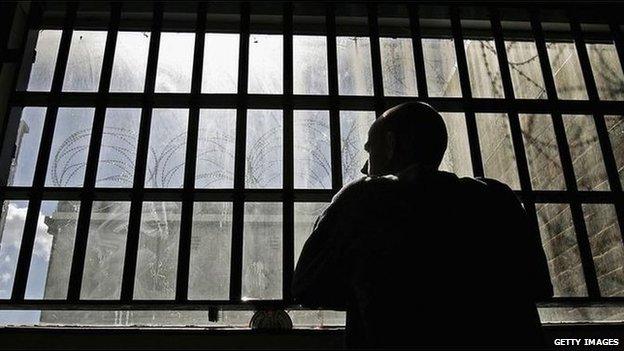Votes for prisoners: The zombie case that won't die
- Published
The European Court of Human Rights has ruled - yet again - that the UK has again breached prisoners' rights by failing to give them the vote. It's another in a long line of defeats for ministers stretching back over 10 years.

That ballot box over there? Just out of reach
As legal battles go, the spat with Strasbourg over which criminals get to stick a cross on a ballot paper has now outlasted the almighty row over whether it's appropriate for the UK to deport terrorism suspects to regimes that have a habit of torturing people.
There have now been at least half a dozen prisoners' votes challenges at the European Court. Just like the plot of a decent zombie movie - every time we think it's all gone away, the issue groans and staggers to its feet and waves its arms in a menacing way at Whitehall, sending officials and ministers fleeing in panic. There's brief respite ... and then the moaning and the lurching all starts again.
My clunky film analogy aside, this latest judgement is not as dramatic as it looks for one simple reason: the judges in the European Court have refused to award damages to the 10 inmates who brought the action, saying the ruling in their favour was enough.
Both the British government and parliamentarians have made clear (in capital letters triple underlined in red ink) that they don't want to give prisoners the vote. They're not the only European government to take such a position.
So had the European Court ordered compensation, it would have sparked another fall-out with the Euro judges - and more calls for the UK to turn its face against the European Convention on Human Rights.
The court is obviously conscious of the political situation it finds itself in - but in reality it rarely orders big payouts - preferring to focus on principles.
Time and again it has refused to order governments across Europe to compensate prisoners over voting bans.
It looks apparent that future claims for compensation will be met with the same response - and the court's decision to refuse to award legal costs may make prospective applicants (and their lawyers) think twice.
However, what's perhaps more interesting is that the ruling once again exposes the court's own internal divisions, external over the principles - and how to translate its opposition to a blanket ban on prisoners voting into practical rules.
In fact, two of the judges didn't see the point in dealing with the complaints - with one very pointedly attacking his own court for making a mess of this issue down the years.
Judge Krzysztof Wojtyczek, the court's Polish representative, says that unless the court is much clearer about what it expects of governments, it is very difficult for them to avoid future challenges from prisoners, external.
Why is that important? The divisions probably mean that despite pressure to change the law, British ministers could gamble yet again on ducking the issue as a general election approaches.
Back in 2009-10, it looked like the then Labour justice secretary, Jack Straw, would be forced to act - but he successfully booted it into the long grass.
Since then we have had proposals and, as of last year, recommendations from a cross-party committee to give the vote to inmates serving a year or less.
Ministers are considering those proposals and we have no idea if and when a bill will go before MPs.
So don't expect legislation this side of a general election - but what happens if the next government refuses again to act?
Well, just like a good zombie movie ...